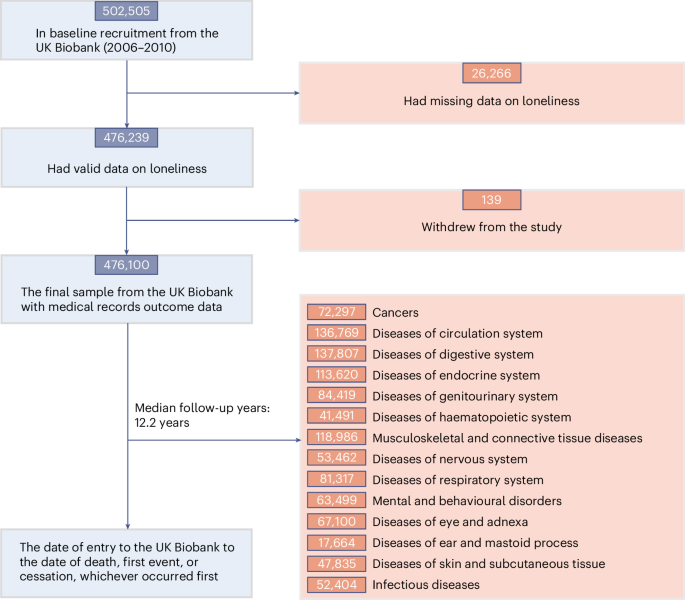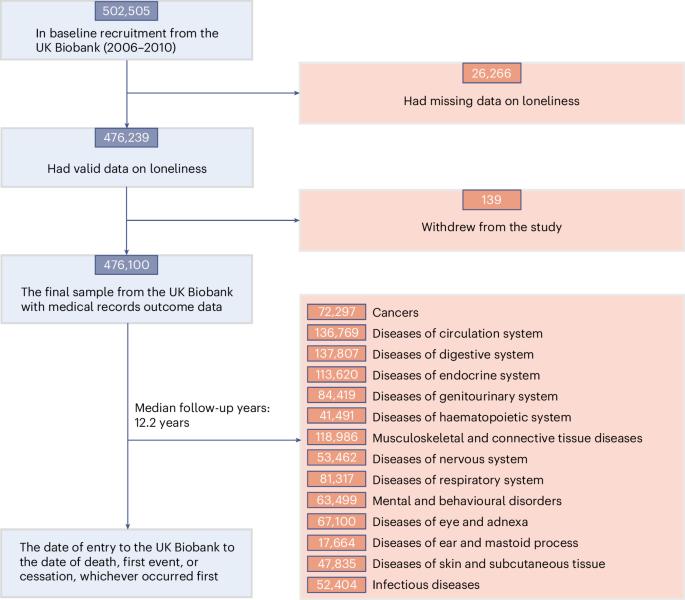Observational and genetic evidence disagree on the association between loneliness and risk of multiple diseases
IF 15.9
1区 心理学
Q1 MULTIDISCIPLINARY SCIENCES
引用次数: 0
Abstract
Loneliness—the subjective experience of social disconnection—is now widely regarded as a health risk factor. However, whether the associations between loneliness and multiple diseases are consistent with causal effects remains largely unexplored. Here we combined behavioural, genetic and hospitalization data from the UK Biobank to examine the associations of loneliness with a wide range of non-overlapping diseases. During a median 12.2-year follow-up, loneliness was associated with greater risks in 13 of 14 disease categories and 30 of 56 individual diseases considered. Of the 30 diseases significantly associated with loneliness, 26 had genetic data available for Mendelian randomization (MR) analyses. After Benjamini‒Hochberg correction and multiple sensitivity analyses within the MR framework, non-causal associations were identified between genetic liability to loneliness and 20 out of the 26 specific diseases, including cardiovascular diseases, type 2 diabetes mellitus, obesity, chronic liver diseases, chronic kidney disease, most neurological diseases and the other common diseases. Genetic liability to loneliness was only potentially causally associated with the remaining six diseases. Socioeconomic factors, health behaviours, baseline depressive symptoms and comorbidities largely explained the associations between loneliness and diseases. Overall, our study revealed a dissociation between observational and genetic evidence regarding the associations of loneliness with multiple diseases. These findings suggest that loneliness may serve as a potential surrogate marker rather than a causal risk factor for most diseases tested here. Loneliness was found to be linked to increased risk for 30 out of 56 diseases in a UK Biobank study. However, genetic analyses show that loneliness likely causes only six diseases. These findings suggest that loneliness is more a potential surrogate marker than a direct cause for most diseases.


观察和遗传证据在孤独与多种疾病风险之间的关系上存在分歧
孤独感--与社会脱节的主观体验--现在被广泛认为是一种健康风险因素。然而,孤独感与多种疾病之间的关联是否与因果效应一致,在很大程度上仍未得到探讨。在此,我们结合英国生物库中的行为、遗传和住院数据,研究了孤独感与多种非重叠疾病之间的关联。在中位 12.2 年的随访期间,孤独与 14 种疾病类别中的 13 种和 56 种单个疾病中的 30 种的更大风险相关。在这 30 种与孤独明显相关的疾病中,有 26 种疾病的基因数据可用于孟德尔随机化(MR)分析。在孟德尔随机分析框架内进行本杰明-霍奇伯格校正和多重敏感性分析后,发现孤独感的遗传因子与 26 种特定疾病中的 20 种存在非因果关系,包括心血管疾病、2 型糖尿病、肥胖症、慢性肝病、慢性肾病、大多数神经系统疾病和其他常见疾病。孤独的遗传易感性只与其余六种疾病有潜在的因果关系。社会经济因素、健康行为、基线抑郁症状和合并症在很大程度上解释了孤独与疾病之间的关联。总之,我们的研究揭示了孤独感与多种疾病相关的观察证据和遗传证据之间的差异。这些研究结果表明,孤独可能是一种潜在的替代标志物,而不是本文测试的大多数疾病的因果风险因素。
本文章由计算机程序翻译,如有差异,请以英文原文为准。
求助全文
约1分钟内获得全文
求助全文
来源期刊

Nature Human Behaviour
Psychology-Social Psychology
CiteScore
36.80
自引率
1.00%
发文量
227
期刊介绍:
Nature Human Behaviour is a journal that focuses on publishing research of outstanding significance into any aspect of human behavior.The research can cover various areas such as psychological, biological, and social bases of human behavior.It also includes the study of origins, development, and disorders related to human behavior.The primary aim of the journal is to increase the visibility of research in the field and enhance its societal reach and impact.
 求助内容:
求助内容: 应助结果提醒方式:
应助结果提醒方式:


